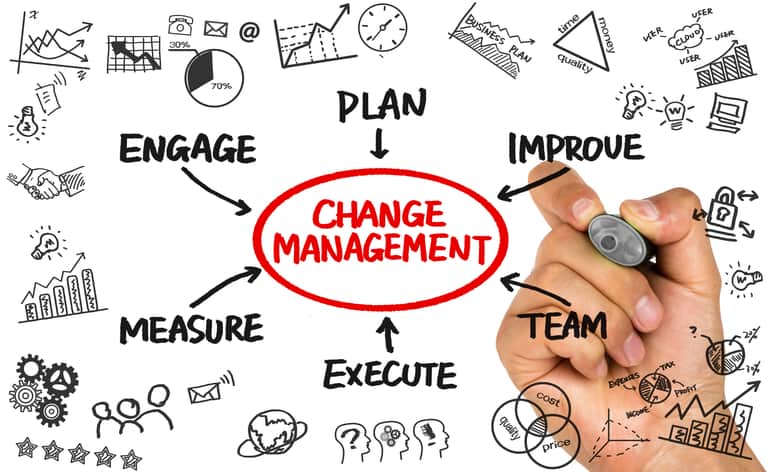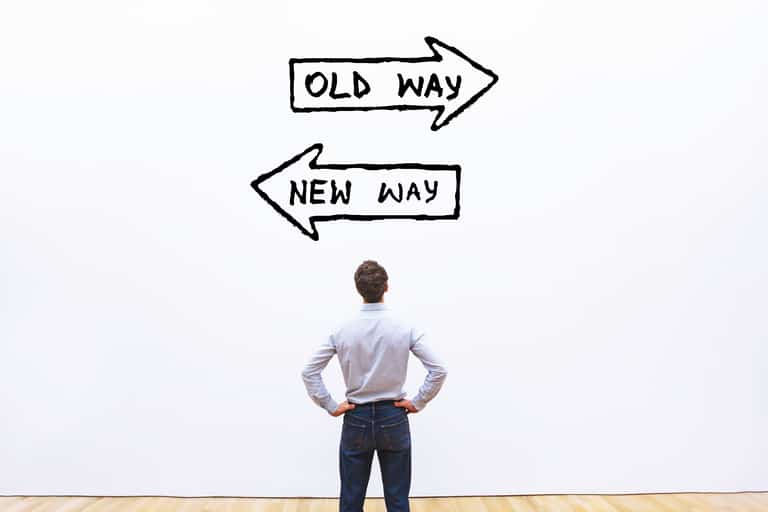
Change Management is incredibly important and a lot of my colleagues talk about having change management skills. Even my professor back then in colleague mentioned that having change management skills is crucial.
But I’ve wondered if change management is actually a skill or is it much more, so I went ahead and researched it. This is what I found about change management being a skill:
Change Management is a process which involves a number of skills, to help move individuals and organizations from one state to another. This is achieved by implementing strategies to effect change, managing change, and helping people and organizations adapt to change.
But you might be wondering why people call it change management skills all the time.
Well, the reason is that change management, as indicated above includes a number of skills that enable an individual to use change management in an effective and efficient way.
After describing why change management isn’t just a skill, I have gone ahead and summarized several crucial skills needed to be good in change management today.
Change Management involves approaches dealing with change.
Let me explain why my research has shown why change management is not a skill but rather a complete process.
According to my research[1] [2][3], change management per se is a simple overall term which defines the approach of supporting individuals and organizations who want to change something related to for example their goals, their current processes (the way they do things currently) or their technologies which they are currently using.
This is in its most basic form change management. Now the way change management practitioners are able to help individuals or organizations to change lays in their knowledge of implementing strategies that can effect on change itself, but also controlling change and lastly help people in their process of adapting to change.

For example one such way would be to have a structured way of how someone can request a change, e.g. if you want to change your cell phone service.
There is a specific process in place for you to be able to change your cell phone service to another.
Similarly, there are mechanisms on the other side, meaning on the side of the cell phone service to take your request and respond to it in a specific predefined way.
Sounds simple right, but now think of a bigger organization with lets say 50,000+ emplyoees, who simply want to switch from using an android device to an apple device.
Well sounds simple in theory – just let the organizaton collect the phones and then hand out new phones right? Well, sadly that is simply not the reality.
This simple change from switching a phone can become a giant headache due to e.g. people not wanting to change, certain applications which are needed for the organization are only working on an android and not on an iPhone and much more.
This is where the change management process comes in, and now we’re at the point of why so many people think of change management being a skill.
Being good in change management involves a quite big number of skills and soft skills to have to support an individual or an organization in making a change.
Think of the phone switching example, a change management practitioner needs to be able to understand what processes are impacted, whcih systems, how many employees are impacted and in what way the employees are impacted.
How the organization should handle potential resistance from android lovers, how this change can and should be communicated and much more.
So in short, change management invovles a number of different skills which gives the general public the impression that change management itself is a skill.
It is not. I have however mentioned down below what skills are falling under the term of change management, in case you are curious.
Especially since knowing about change management is immensly important for every person on the planet.
Just think of the Corona-virus (Covid-19) pandemic and how you as an individual had to handle and adjust to such a drastic change in our society.
What skills are needed to become good in change management?
This varies from article to article but during my research, I did find a couple of repeating skills that are strongly associated to support with the change management process, either from an individual point of view or from an organizational:
1. Being good in communicating
Communication is absolutly critical for managing change, especially for the respective change management agent who has to prepare, plan and execute the change process.
The number one thing if we come back to the phone example is that the change within an organization is driven by the employees itself.
Meaing the employees need to be convinced, informed and guided while making the change. This is only achived by communicating effectvly on the vision of why the organizaton is making the change.
The concrete plan how the change process will happen, so in our example with the phone exchange, who will get a new phone, how do you receive a new phone. What is the timeline of when the phones will be exchanged and so on.
And lastly elements such as the benefit of changing the phone, so the employees specifically understand why making this change is a good thing.
If you keep your employees well informed then this helps in reducing the employee resistance, boosts their motivation, helps with the collaboration and support.
And you even recieve better and more qualitative feedback from your employees.
So communicating often and in a clear way is incredibly important for the success of the change management process.
If you lack this skill there are a variety of online courses to choose from to help you get better in communication.
2. Being able to coach others
A good skill to have when going through the change management process is to be able to enable others to develop and support the ability of managers, so they can in turn coach their employees about the for example new change initiative or process.
This requires that the change maangement practitioner has up-to-date information on change management methodologies, frameworks and best practices.
And to transfer knwlede to individualls such as managers using individual or group exercises, or e.g. workshops.

So for example you could teach every manager how to use an iOS phone and how this type of phone can help improve productivity if used correctly.
You would also need to coach them on the benefit of the change, how the change is executed what they need to consider during the change process and so on.
After you have coached them, these managers are coaching their own employees about the change and its effect.
3. Being able to lead
Being able to lead is an essential skill to have when trying to implement change for an organization or for an individual.
In an organizational setting it is important that you as a role model set an example which other employees can follow.
You need to be able to have the backbone to defend the vision of why the change is necessary and showcase the direction in which your colleagues should move as well.
Leadership skills are crucial to organize employees, push projects so they get done and set an example.
4. Being able to analyze and plan
In both areas, making an change for an individual or within an organization, requires the skill of analysis and being able to plan or create a strategy to achieve the desired goal.
The skill of analyzing the organization, to dig deep of how the organization currently works, why they work like this, who might block the change, and why are just a small number of the things included in this skill.
So for example, it is important to be able to think strategically about how to for example communicate with employees should be done, how the change can be for example executed with the best outcome but by investing minimal resources.
